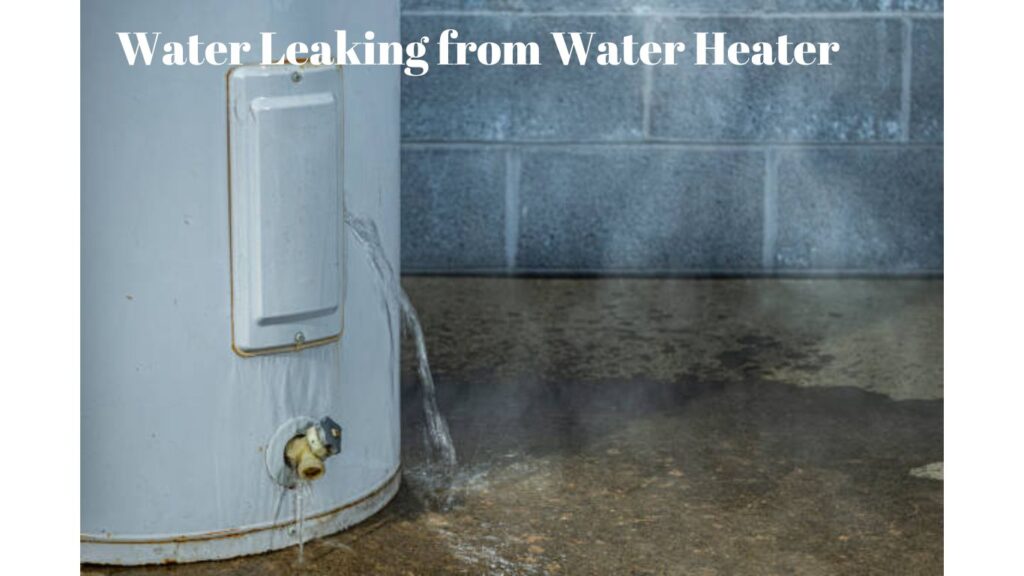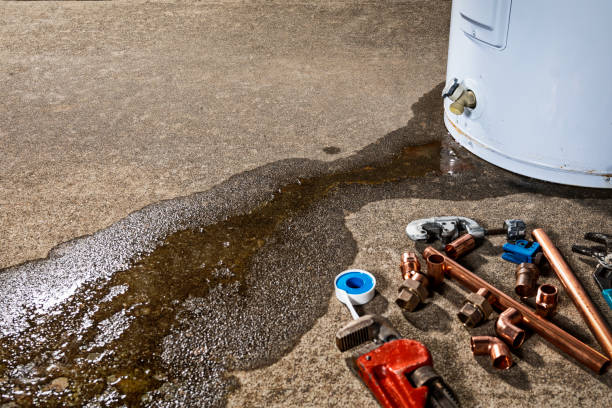
If you’ve noticed water leaking from your water heater, it’s important to address the issue as soon as possible. A leaking water heater can cause damage to your home and can even be dangerous if left unchecked. There are a few common reasons why water heaters leak, and understanding these reasons can help you determine the best course of action.
One possible cause of a leaking water heater is a faulty valve. The pressure relief valve, which is designed to release excess pressure from the tank, can sometimes become stuck or malfunction. This can cause water to leak from the valve, which is located near the top of the tank.
Another potential cause of a leaking water heater is a damaged or corroded tank. Over time, the metal of the tank can become weakened and develop small holes or cracks, which can allow water to escape. If you suspect that your tank is damaged, it’s important to have it inspected by a professional as soon as possible.
Signs of Water Leakage
If you suspect that your water heater is leaking, there are several signs you can look out for. Here are some of the most common indicators of water leakage:
Puddles of Water
The most obvious sign of water leakage is the presence of puddles of water around your water heater. If you notice water pooling on the floor around your water heater, it is likely that there is a leak somewhere in the system.
Unusual Sounds
Another sign of water leakage is unusual sounds coming from your water heater. If you hear a hissing or popping sound, it could be a sign that water is leaking from the tank and coming into contact with the heating element.
Rust and Corrosion
Rust and corrosion around your water heater can also be an indication of water leakage. If you notice rust or corrosion on the outside of the tank or on the pipes leading to and from the tank, it could be a sign that water is leaking and causing damage to the system.
It is important to address any signs of water leakage as soon as possible to prevent further damage to your water heater and your home. If you notice any of these signs, you should contact a professional plumber to assess the situation and make any necessary repairs.
Causes of Water Leakage
Loose Drain Valve
One of the most common causes of water leakage from a water heater is a loose drain valve. This valve is located at the bottom of the tank and is used to drain the water heater for maintenance or repairs. Over time, the valve can become loose and start to leak water. If you notice water dripping from the valve, it may be a sign that it needs to be tightened or replaced.
Faulty Temperature and Pressure Relief Valve
Another common cause of water leakage is a faulty temperature and pressure relief valve. This valve is designed to release pressure and prevent the water heater from overheating. If the valve is faulty or malfunctioning, it can cause water to leak from the tank. This is a serious issue that should be addressed immediately, as it can lead to dangerous conditions such as explosions or fires.
Corrosion and Rust
Corrosion and rust can also cause water leakage from a water heater. Over time, the metal tank can corrode and rust, leading to holes and cracks in the tank. This can cause water to leak out of the tank and onto the floor. If you notice rust or corrosion on your water heater, it may be time to replace it.
In summary, the three main causes of water leakage from a water heater are a loose drain valve, a faulty temperature and pressure relief valve, and corrosion and rust. If you notice any of these issues, it is important to address them immediately to prevent further damage or dangerous conditions.

How to Fix Water Leakage
If you have noticed water leaking from your water heater, you must act fast to prevent further damage to your home. Here is what you need to do to fix the problem:
Turn Off the Power Supply
Before you do anything, you must turn off the power supply to your water heater. This will prevent any electrical accidents while you work on the heater. To turn off the power supply, follow these steps:
- Locate the circuit breaker that controls the water heater.
- Flip the switch to the “off” position.
- Double-check that the power is off by testing the heater.
Drain the Tank
Once the power is off, you can drain the tank to remove any excess water. This will make it easier to work on the heater and prevent water from leaking out while you fix it. Here is how you can drain the tank:
- Turn off the cold water supply valve.
- Attach a hose to the drain valve at the bottom of the tank.
- Open the drain valve and let the water drain out.
- Once the water has drained out, close the drain valve.
Replace the Faulty Valve or Element
The most common cause of water leakage in a water heater is a faulty valve or element. To fix this problem, you will need to replace the faulty part. Here is how you can do it:
- Identify the faulty valve or element.
- Turn off the water supply to the heater.
- Drain the tank as described above.
- Disconnect the faulty valve or element.
- Replace the faulty part with a new one.
- Reconnect the new valve or element.
- Turn on the water supply and fill the tank.
- Test the heater to ensure it is working properly.
By following these steps, you can fix water leakage from your water heater and prevent further damage to your home. Remember to always turn off the power supply and water supply before working on your water heater. If you are not comfortable fixing the problem yourself, contact a professional plumber for assistance.
Water heater leaking from bottom
If water is leaking from the bottom of your water heater, it’s important to find out why and take corrective action. According to Home Inspection Insider, one of the possible causes of water heater leaks from the bottom is a faulty drain valve. The drain valve is responsible for releasing excess water and sediment from the tank. If it’s loose or damaged, water can leak out of the bottom of the tank. In this case, tightening or replacing the drain valve can solve the problem.
Another possible cause of water heater leaks from the bottom is a corroded tank. Over time, the inside of the tank can corrode, leading to small holes or cracks. This can cause water to leak out of the bottom of the tank. Unfortunately, a corroded tank cannot be repaired and the entire water heater will need to be replaced. If you suspect that your water heater tank is corroded, it’s important to act quickly to prevent further damage and potential flooding
Preventing Water Leakage
Regular Maintenance
To prevent water leakage from your water heater, it is important to perform regular maintenance. This includes checking the pressure relief valve, the anode rod, and the temperature and pressure (T&P) valve.
The pressure relief valve should be checked at least once a year to ensure it is functioning properly. If it is not functioning properly, it can cause the tank to overheat and potentially explode.
The anode rod should also be checked at least once a year. This rod is designed to attract corrosive elements in the water, which can cause the tank to rust and leak. If the anode rod is worn out, it should be replaced immediately.
The T&P valve should be checked at least once a year to ensure it is functioning properly. This valve is designed to release pressure and prevent the tank from exploding. If it is not functioning properly, it can cause the tank to overheat and potentially explode.
Replacing Old and Worn Out Parts
If you notice any signs of wear and tear on your water heater, it is important to replace the old and worn out parts as soon as possible. This includes the anode rod, the T&P valve, and any other parts that are showing signs of wear and tear.
Replacing old and worn out parts can prevent water leakage and extend the life of your water heater. It is important to use high-quality parts that are designed to last, as using cheap or low-quality parts can cause more problems in the long run.
By performing regular maintenance and replacing old and worn out parts, you can prevent water leakage from your water heater and ensure it lasts for many years to come.
